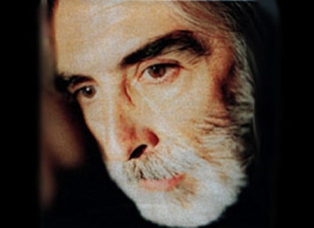 Michael Haneke, that cheery chronicler of abject inhumanity, is frustrating our expectations in new and, hopefully, exciting ways. After the art house success of Caché in 2005, the director blew minds all over the cineaste-sphere when he decided to do an English-language remake of his excellent 1997 mindfuck, Funny Games. Now, with Funny Games ’07 finished, the word at Cannes is that Haneke is prepping a costume drama set during the decline of the Austro-Hungarian empire.
Michael Haneke, that cheery chronicler of abject inhumanity, is frustrating our expectations in new and, hopefully, exciting ways. After the art house success of Caché in 2005, the director blew minds all over the cineaste-sphere when he decided to do an English-language remake of his excellent 1997 mindfuck, Funny Games. Now, with Funny Games ’07 finished, the word at Cannes is that Haneke is prepping a costume drama set during the decline of the Austro-Hungarian empire.
Currently titled The White Ribbon, Haneke is working on the screenplay with Jean-Claude Carriere, a legendary, insanely prolific writer whose credits include The Discreet Charm of the Bourgeoisie, Belle du Jour, The Tin Drum, The Return of Martin Guerre and That Obscure Object of Desire. (That, my friends, is what you call an oeuvre.) Geoffrey Macnab of The Guardian seems to think The White Ribbon is going to qualify as a Heimatfilm, but I’ve serious doubts as to whether Haneke could comfortably nestle into that pastoral genre. If anything, the director will use this as an opportunity to comment on the banality of costume dramas while conveying something terribly unflattering about human behavior. Or maybe Macnab’s got it wrong, and this will be a big World War I epic.
Personally, I’d be happy with either one. I’d also like to see that newfangled Funny Games, like, now, especially since it sounds like Warner Independent will market it to teens as a torture-heavy suspense flick in the Saw vein. They better not cop out on this; what better way to punish audiences for lapping up torture porn than to give them Haneke’s searing attack on middle-class fears of crime and security? They’ll be pissed, but better off for it.
Haneke’s latest version of Funny Games – which has substituted DVD for video like you only runs twenty seconds shorter than the original, and stars Naomi Watts, Tim Roth and Michael Pitt. Apparently, the only reason it’s not in competition at this year’s Cannes Film Festival is due to Haneke not wanting to contend with the same film twice. George Sluizer never had this problem.